Ecosyste.ms: Awesome
An open API service indexing awesome lists of open source software.
https://github.com/procyon-rs/vega_lite_4.rs
rust api for vega-lite v4
https://github.com/procyon-rs/vega_lite_4.rs
Last synced: 2 days ago
JSON representation
rust api for vega-lite v4
- Host: GitHub
- URL: https://github.com/procyon-rs/vega_lite_4.rs
- Owner: procyon-rs
- License: apache-2.0
- Created: 2019-12-12T17:31:12.000Z (almost 5 years ago)
- Default Branch: master
- Last Pushed: 2023-07-17T04:31:04.000Z (over 1 year ago)
- Last Synced: 2024-10-13T01:13:20.591Z (about 1 month ago)
- Language: Rust
- Size: 458 KB
- Stars: 27
- Watchers: 5
- Forks: 8
- Open Issues: 6
-
Metadata Files:
- Readme: README.md
- License: LICENSE
Awesome Lists containing this project
- awesome-vega - vega_lite_4 - Rust (Vega-Lite). (Wrappers / Papers)
README
# Vega-Lite V4 for Rust
[](https://spdx.org/licenses/Apache-2.0.html)
[](https://crates.io/crates/vega_lite_4)
[](https://docs.rs/vega_lite_4)
[](https://github.com/procyon-rs/vega_lite_4.rs/actions)
[](https://codecov.io/gh/procyon-rs/vega_lite_4.rs)
[](https://dependabot.com)
A Rust API for Vega-Lite V4 to build chart with a rusty API.
Similar to the [Altair](https://altair-viz.github.io/) project in python, this crate build upon [Vega-Lite](https://vega.github.io/vega-lite/) specifications. Vega-Lite is a high-level grammar of interactive graphics. It provides a concise JSON syntax for rapidly generating visualizations to support analysis. Vega-Lite specifications can be compiled to [Vega](https://vega.github.io/vega/) specifications. Those specifications are then parsed by Vega’s JavaScript runtime to generate both static images or interactive web-based views.
This crate has a complete mapping of Vega-Lite 3.4 specification and can be found in `src/schema.rs`.
With all the types and structs, it's possible to create your Rust Vegalite graph that will be serialize into a Vega-Lite JSON. Thanks to [Showata](https://crates.io/crates/showata) the resulting visualization can be display in your Web-Browser or in a Rust [Jupyter Notebook](https://crates.io/crates/evcxr_jupyter).
It's also possible to use an existing Vega-Lite json and plug your data source seamlessly. This way you can leverage existing vizualisation and adapt it to your design.
## Examples
In order to have a complete mapping of the Vega-Lite V4 specification the code for the schema was automaticlly generated.
To help describe all the possible features a [gallery of example is provided on github](https://github.com/procyon-rs/vega_lite_4.rs/blob/master/examples/)
[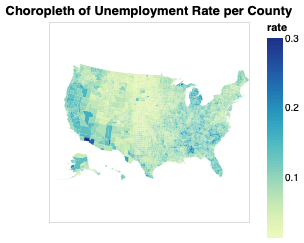 ](https://github.com/procyon-rs/vega_lite_4.rs/blob/master/examples/cloropleth_unemployment.rs)
](https://github.com/procyon-rs/vega_lite_4.rs/blob/master/examples/cloropleth_unemployment.rs)
[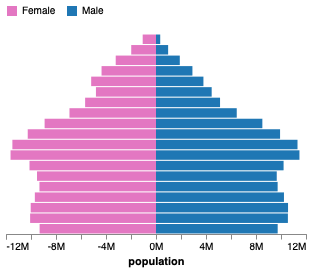 ](https://github.com/procyon-rs/vega_lite_4.rs/blob/master/examples/diverging_stacked_bar_chart.rs)
](https://github.com/procyon-rs/vega_lite_4.rs/blob/master/examples/diverging_stacked_bar_chart.rs)
[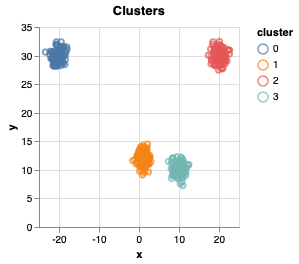 ](https://github.com/procyon-rs/vega_lite_4.rs/blob/master/examples/scatterplot.rs)
](https://github.com/procyon-rs/vega_lite_4.rs/blob/master/examples/scatterplot.rs)
[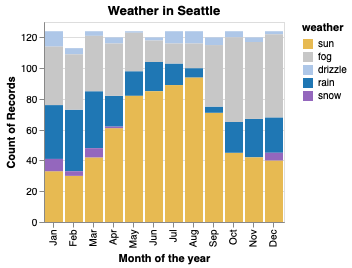 ](https://github.com/procyon-rs/vega_lite_4.rs/blob/master/examples/stacked_bar_chart.rs)
](https://github.com/procyon-rs/vega_lite_4.rs/blob/master/examples/stacked_bar_chart.rs)
[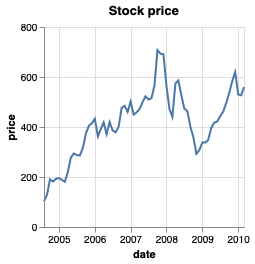 ](https://github.com/procyon-rs/vega_lite_4.rs/blob/master/examples/stock_graph.rs)
](https://github.com/procyon-rs/vega_lite_4.rs/blob/master/examples/stock_graph.rs)
[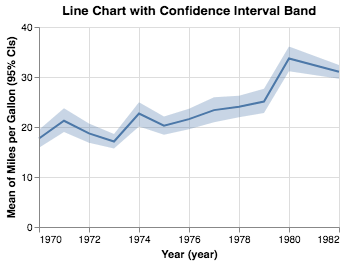 ](https://github.com/procyon-rs/vega_lite_4.rs/blob/master/examples/line_with_interval.rs)
](https://github.com/procyon-rs/vega_lite_4.rs/blob/master/examples/line_with_interval.rs)
To launch all examples
```sh
cargo install cargo-make
cargo make run-all-examples
```
### Simple chart using ndarray generated data
```rust
let values: Array2 = Array::random((100, 2), StandardNormal);
let chart = VegaliteBuilder::default()
.title("Random points")
.data(values)
.mark(Mark::Point)
.encoding(
EncodingBuilder::default()
.x(XClassBuilder::default()
.field("data.0")
.def_type(StandardType::Quantitative)
.build()?)
.y(YClassBuilder::default()
.field("data.1")
.def_type(StandardType::Quantitative)
.build()?)
.build()?,
)
.build()?;
chart.show()?;
```
### Simple chart using existing json definition with new data
```rust
// Use existing vega-lite json specification
let spec = r##"{
"$schema": "https://vega.github.io/schema/vega-lite/v4.0.json",
"encoding": {
"x": {
"field": "data.0",
"type": "quantitative"
},
"y": {
"field": "data.1",
"type": "quantitative"
}
},
"mark": "point",
"title": "Random points"
}"##;
// Use you own data to populate the chart
let values: Array2 = Array::random((100, 2), StandardNormal);
let mut chart: Vegalite = serde_json::from_str(spec)?;
chart.data = values.into();
// display the chart using `showata`
chart.show()?;
```
## Features
| name | enabled by default | functionnality | related crate |
| --------- | ------------------ | -------------------------------------------------- | --------------------------------------------- |
| show_vega | yes | can display charts in the browser or in a notebook | [showata](https://crates.io/crates/showata) |
| csv | yes | can load data from a csv | [csv](https://crates.io/crates/csv) |
| ndarray | yes | can load data from a ndarray | [ndarray](https://crates.io/crates/ndarray) |
| nalgebra | no | can load data from a nalgebra::Matrix | [nalgebra](https://crates.io/crates/nalgebra) |
| rulinalg | no | can load data from a rulinalg::matrix::Matrix | [rulinalg](https://crates.io/crates/rulinalg) |
| polars | no | can load data from a polars::prelude::DataFrame | [polars](https://crates.io/crates/polars) |
## Links
- [Wiki - AGuideToRustGraphicsLibraries2019](https://wiki.alopex.li/AGuideToRustGraphicsLibraries2019)
- [A Dramatic Tour through Python’s Data Visualization Landscape (including ggplot and Altair) – Regress to Impress](https://dsaber.com/2016/10/02/a-dramatic-tour-through-pythons-data-visualization-landscape-including-ggplot-and-altair/)
- [Specifying Data in Altair — Altair 3.0.0 documentation](https://altair-viz.github.io/user_guide/data.html#long-form-vs-wide-form-data)
- [Visualization — list of Rust libraries/crates // Lib.rs](https://lib.rs/visualization)
- [Quicktype](https://quicktype.io/) (got issue with the [alternative](https://transform.now.sh/json-to-rust-serde)) was used to bootstrap `src/schema.rs` from the [vega-lite's json schema](https://vega.github.io/schema/vega-lite/v4.json)
## Troubleshoot
### Stack size
The vegalite json schema is large with lot of alternative, so the typed rust version create a large set of struct and enum (the generated source file before macro expension is 28K lines). So the size of a model in stack could be large (it's also why Box is used in the struct).
On wasm32, with the default stack size (~ 1 MB), using vegalite_4 can raise error like:
- crash tab with `SIGSEVG` (on chromium based browser)
- `Uncaught (in promise) RuntimeError: memory access out of bounds` or simply `Uncaught (in promise) RuntimeError`
The current work arround is to increase the stacksize (eg ~ 1.5 MB). For cargo based project you can add into `.cargo/config` file of the project:
```toml
[target.wasm32-unknown-unknown]
rustflags = [
"-C", "link-args=-z stack-size=1500000",
]
```